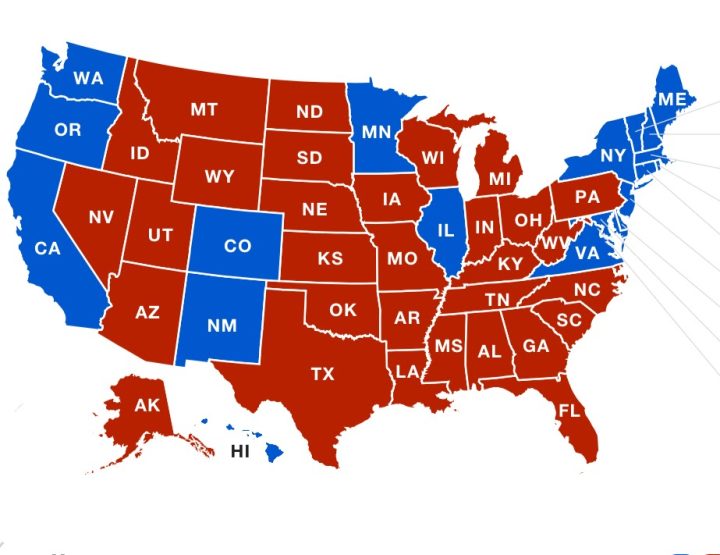“Today, for some people it is morning in America. For others it is America in mourning.” This was how our rector, Eileen O’Brien, opened the service on Sunday after the election.
Trump’s victory was not unexpected but the scale of it was stunning. Many who are working for justice, healing and constructive community change are exhausted. Columnist Margaret Renkl writes in Against panic: a survival kit that we will need to “find what give us joy even amid the fight, and we will need to find a way to rest even when the fight is too much to bear …So for me there will be more watchful stillness.”

What questions do we need to ask ourselves? What can we learn?
Are racial divides being superseded by class divides? It came as a surprise to many that such a large number of working-class Americans, including a greatly increased percentage of Latinos as well as young people without a college degree voted for Trump. The New York Times called them “a battering ram against the ruling establishment and expert class of elites.”
I had flagged this disconnect and blind spot in the Democrats’ strategy in my blog a few days before the election. After Trump’s first victory eight years ago, I wrote “However misguided or alarming its expression, the rise of populism in the US and in Europe reveals deep frustration and pain that political establishments have failed to address.”
In my own state of Texas, where 1 in 4 Hispanic voters were casting ballots for the first time, Trump achieved a near sweep of the largely Spanish-speaking border counties and at the national level he won 45% of their votes, an increase of 13% from 2020.
Clearly, economic concerns and waves of uncontrolled border crossings played a major part in the failure of Kamala Harris’s bid for the White House.
Did Democrats put too much emphasis on cultural and identity issues and too little on prices at the grocery store? “We were talking about prosperity and hope while the Democrat Party was talking about pronouns,” said Representative Monica De La Cruz. In 2022 she became the first Republican member of Congress elected to a district stretching from the border to the suburbs of San Antonio. Traditional family values are important to most Hispanics as well as hard work and upward mobility. Many have migrated from lawless societies, so campaigns by progressive in recent years to “defund the police” cost votes in regions like south Texas.
And what to make of the continuing gender gap? Some 55% of men (60% of white men and 59% of Latinos) voted Republican. Millions of women will be angry, incredulous and disheartened that yet again America was not ready to elect a highly qualified woman. But 52% of white women still voted for the GOP candidate. Although a majority of women disapproved of Trump’s personality, his rhetoric and his record of sexual assault, this did not overcome their other concerns.
The overwhelming influence of right-wing media is clearly a primary cause of Trump’s success. As Michael Tomasky writes in The New Republic, “the right-wing media sets the news agenda in this country. Not the New York Times. Not the Washington Post. Not CBS, NBC, and ABC.” Tomasky says the news agenda is set by Fox News, Newsmax, the Bott Radio Network (Christian radio), Elon Musk’s X, and huge podcasts like Joe Rogan’s that feed their audiences a diet of slanted and distorted information. They are heavily backed by billionaires.
But the most important lesson may be, as several colleagues have commented, that Americans have not been listening to each other. In recent decades we have grown further and further apart physically (where we live), emotionally, and in our view of life. Cell phones have connected us with people across the world, but we may spend less time actually talking with our neighbors. We have few shared values. US Representative Marie Gluesenkamp Peres, a Democrat in a conservative rural part of Washington state, is quoted in the New York Times: “A fundamental mistake people make is condescension.” Back in 2016 Nicholas Kristof wrote wrote a column in which he cautioned against “liberal arrogance – the implication that conservatives don’t have anything significant to add to the discussion.” As a self-confessed liberal he writes, “We’re fine with people who don’t look like us, as long as they think like us.”
On the positive side, the election process appears to have been almost flawless. There was no violence. Huge numbers voted by mail or flocked to the polling booths. Lessons were learned from 2020, and safeguards were put in place. Biden says the election was “honest, fair and transparent,” drawing an unspoken contrast with Trump’s refusal to concede his loss four years ago. This should affirm Americans’ faith in the democratic process.
Andy Kim became the first Korean American elected to the Senate. Ruben Gallego is Arizona’s first Hispanic senator. And in another first, with the victories of Lisa Blunt of Delaware and Angela Alsobrooks of Maryland two black women will serve together in the Senate.
Despite his rhetoric, Trump is no friend of the working class. He will give tax breaks to the wealthy. He will allow companies to fire workers who try to unionize. High tariffs will increase prices. But liberals have serious work to do in moving out of the confines of like-minded academic circles and think tanks, taking time to listen carefully and respectfully, and welcoming the full engagement of those whose views have been shaped by very different life experiences.
A few months before the first Trump victory, I spent two days in Chicago with 30 racial healing practitioners from many different backgrounds and cities convened by the W.K. Kellogg Foundation under the leadership of senior advisor Dr Gail Christopher (now executive director of the National Collaborative for Health Equity) in preparation for the launch of a national Truth, Racial Healing & Transformation project. We recognized that the American story is complex and defies easy stereotyping. There are evils that must be confronted and acknowledged. But we should be cautious about seeking any one “truth.” Truth does not belong exclusively to any one political or cultural viewpoint.
My blog following that gathering noted warnings for Democrats from several commentators. And I wrote, “In this era of rapid demographic, cultural and economic change, anxiety is natural. And while much of this change is inevitable and may ultimately be positive, no change feels good to those who fear that they will be left behind.” Emotion outweighs reason. People will not listen to facts if they feel their voices and their stories are not being heard. They will even act against their own best interests if they feel disrespected.
As Gail Christopher told the group in Chicago and has reminded us many times since, we must honor the humanity and dignity of every individual. Above all we must “lead with love.”
